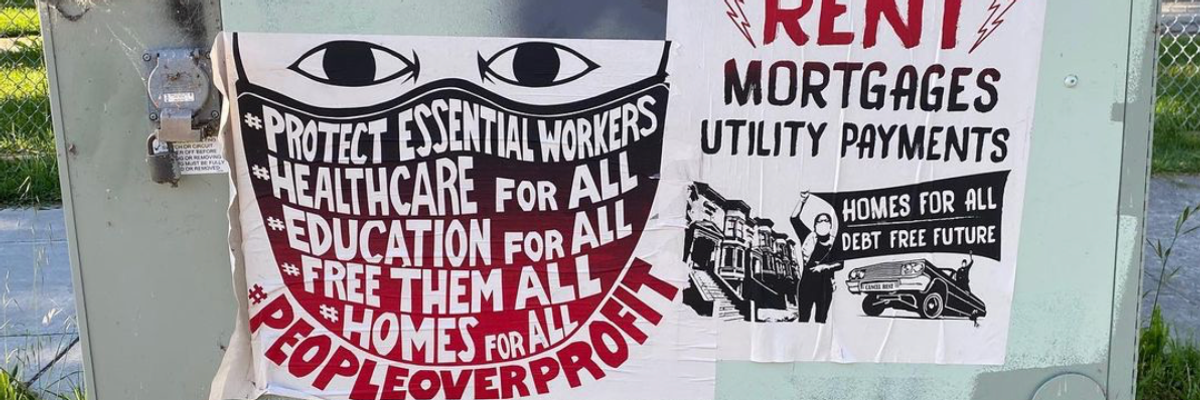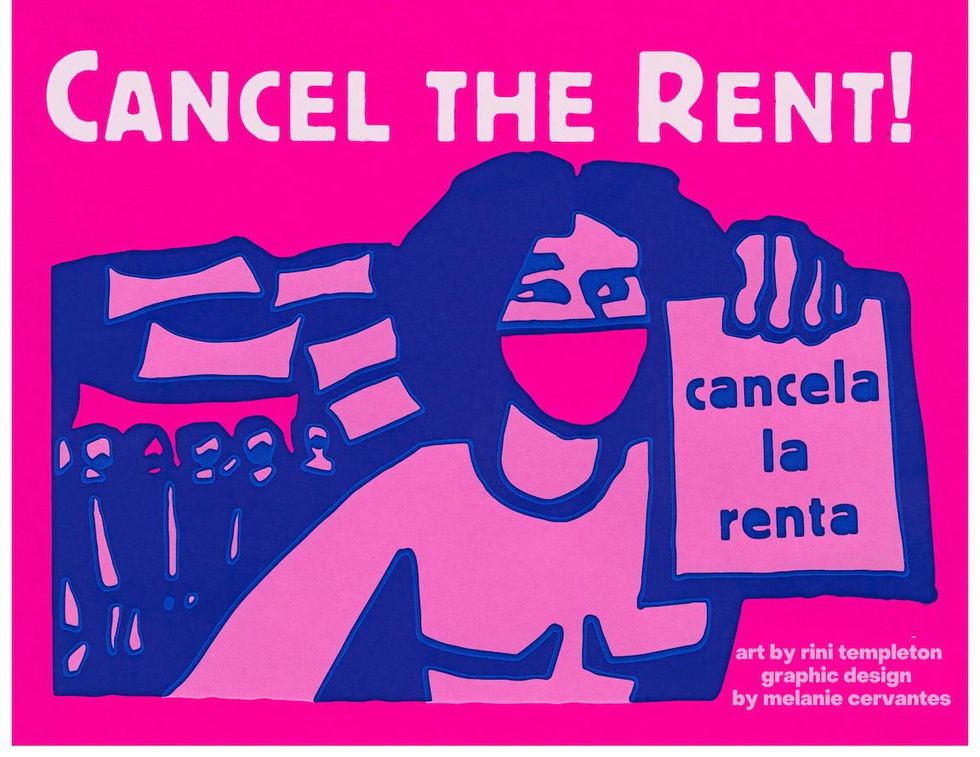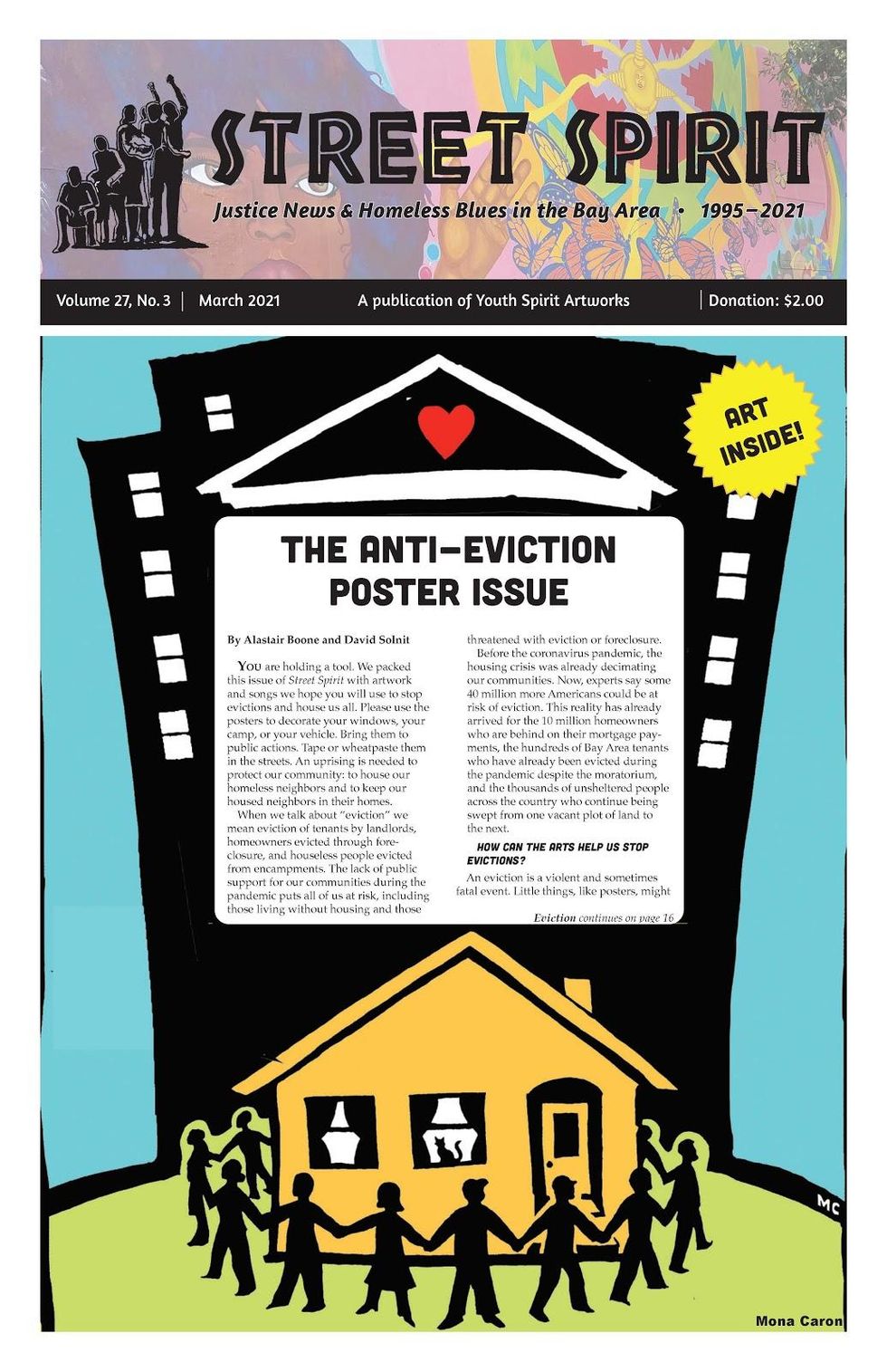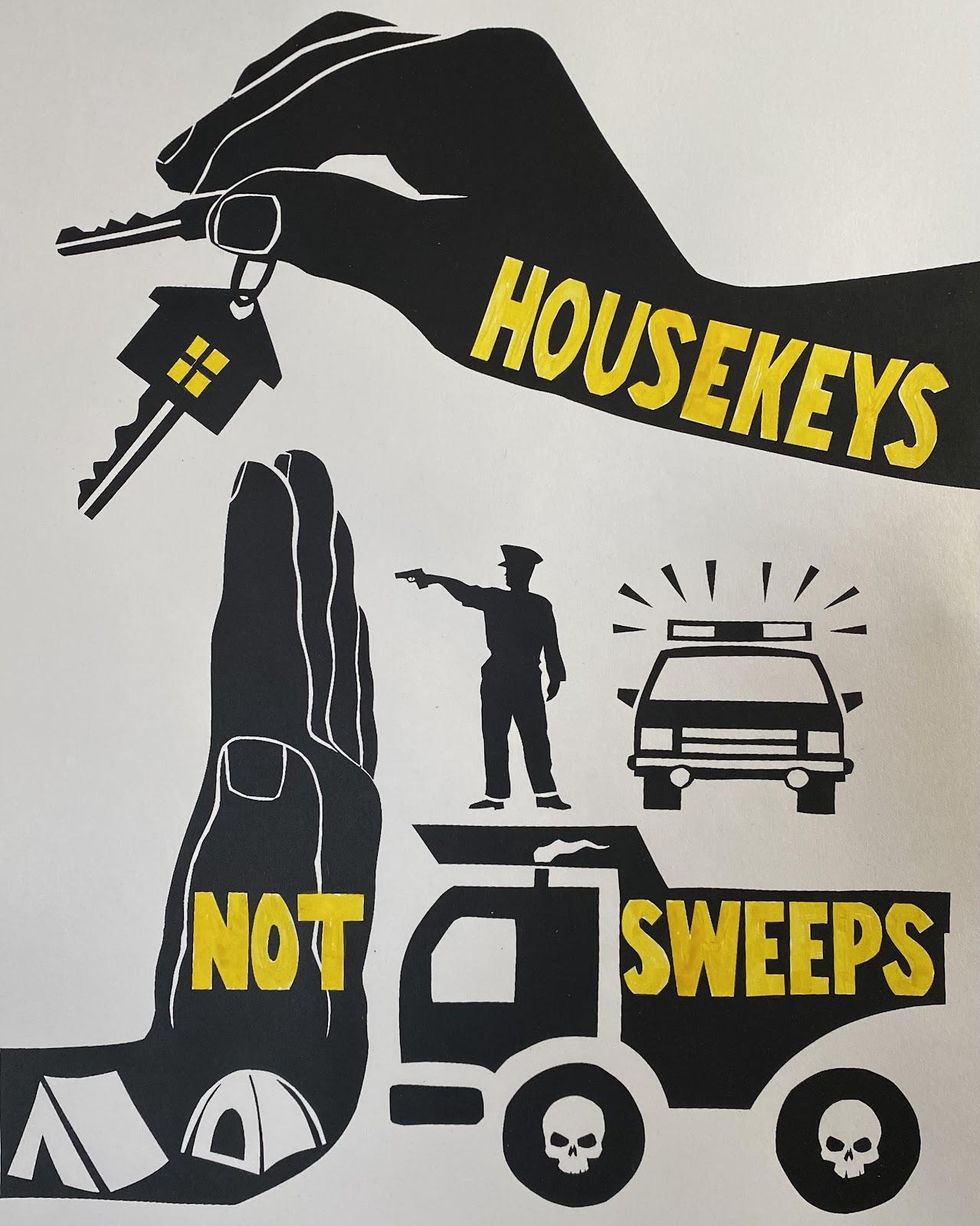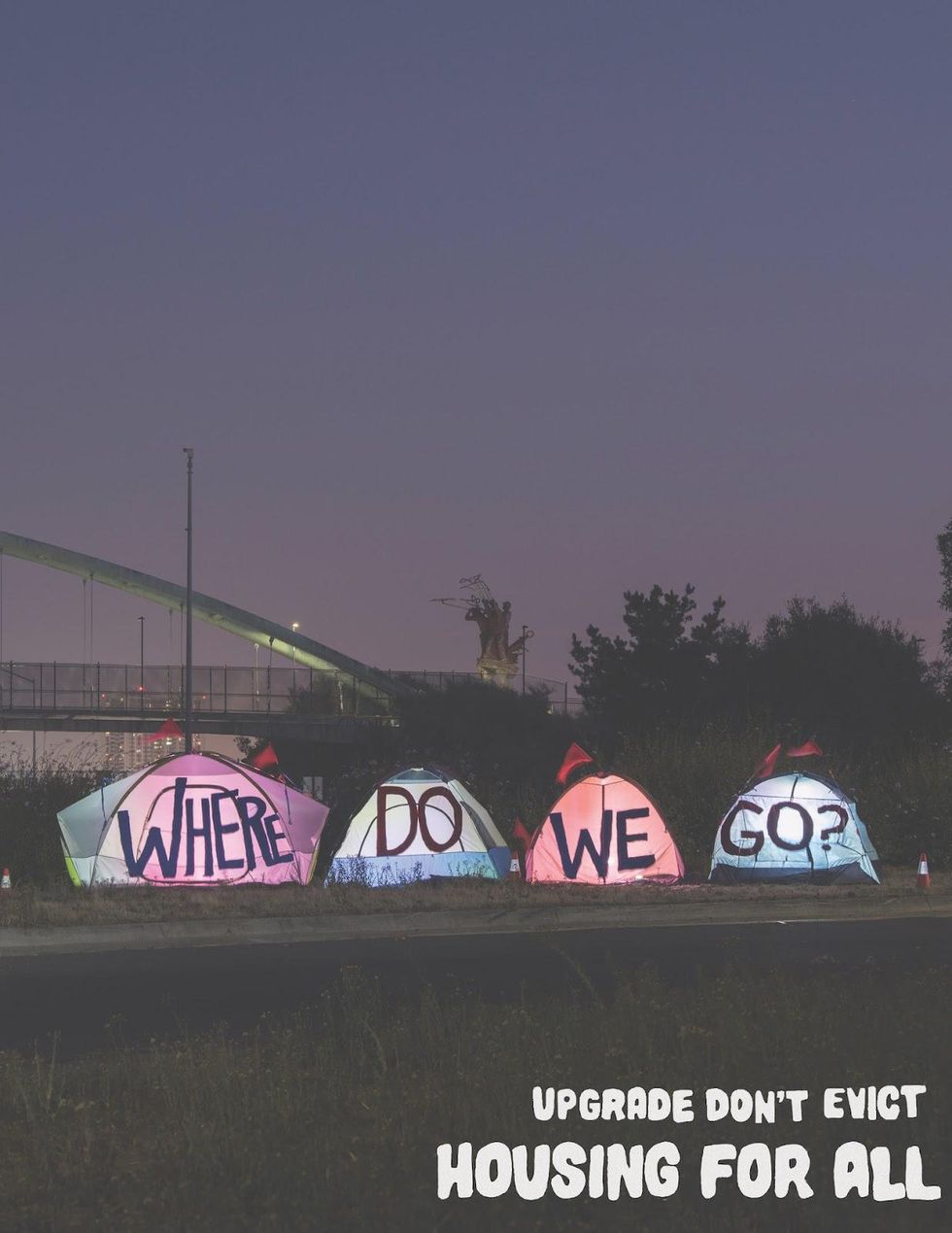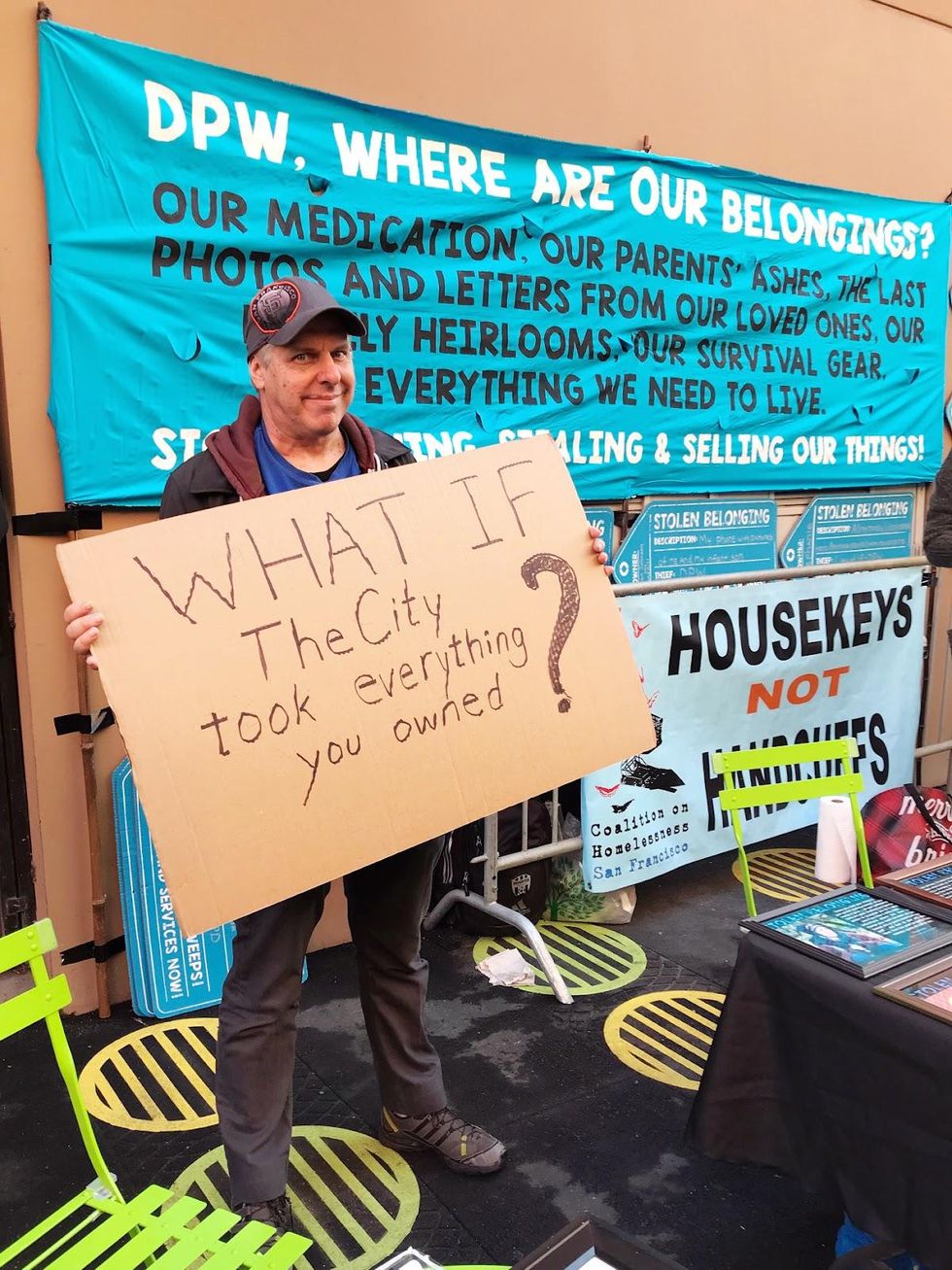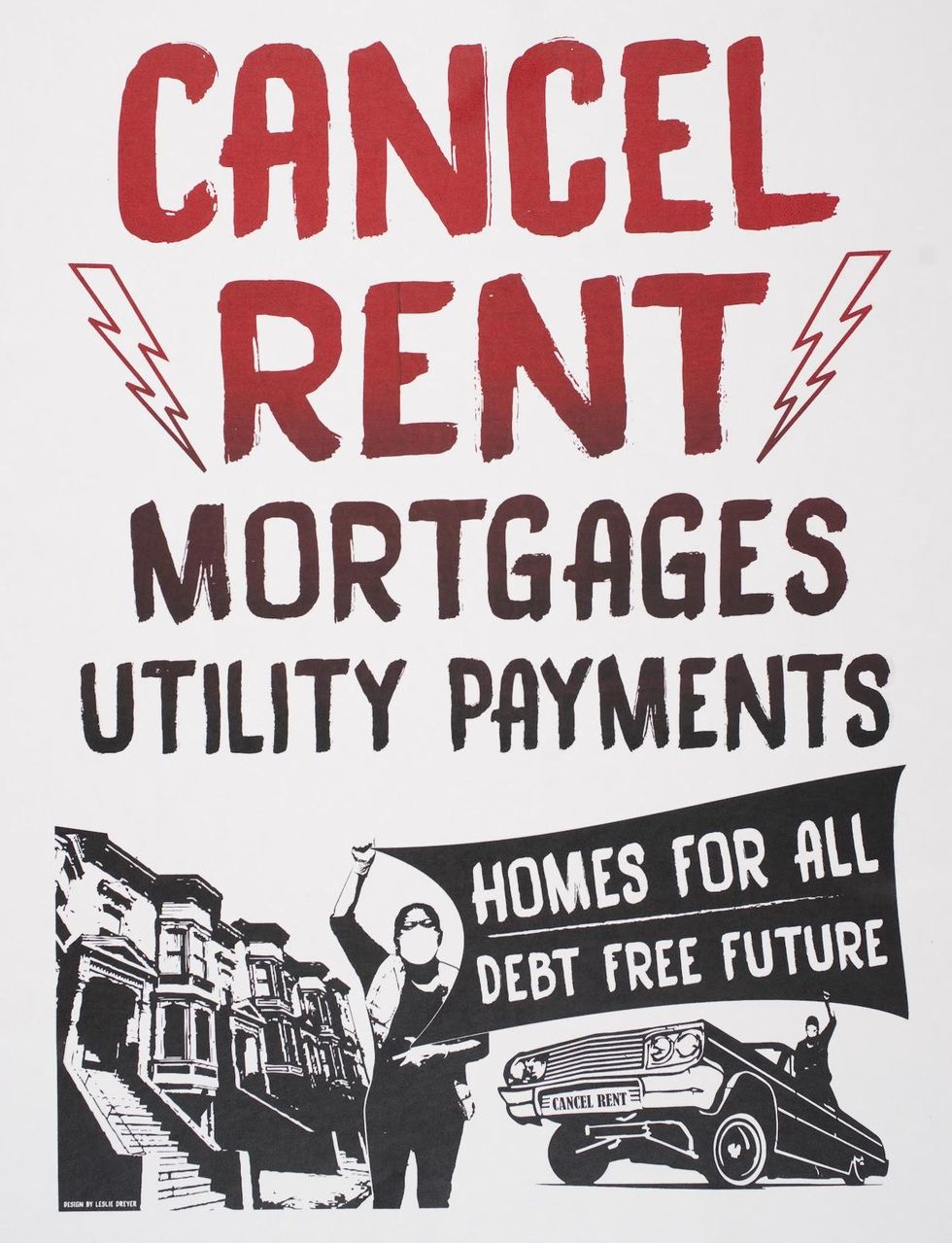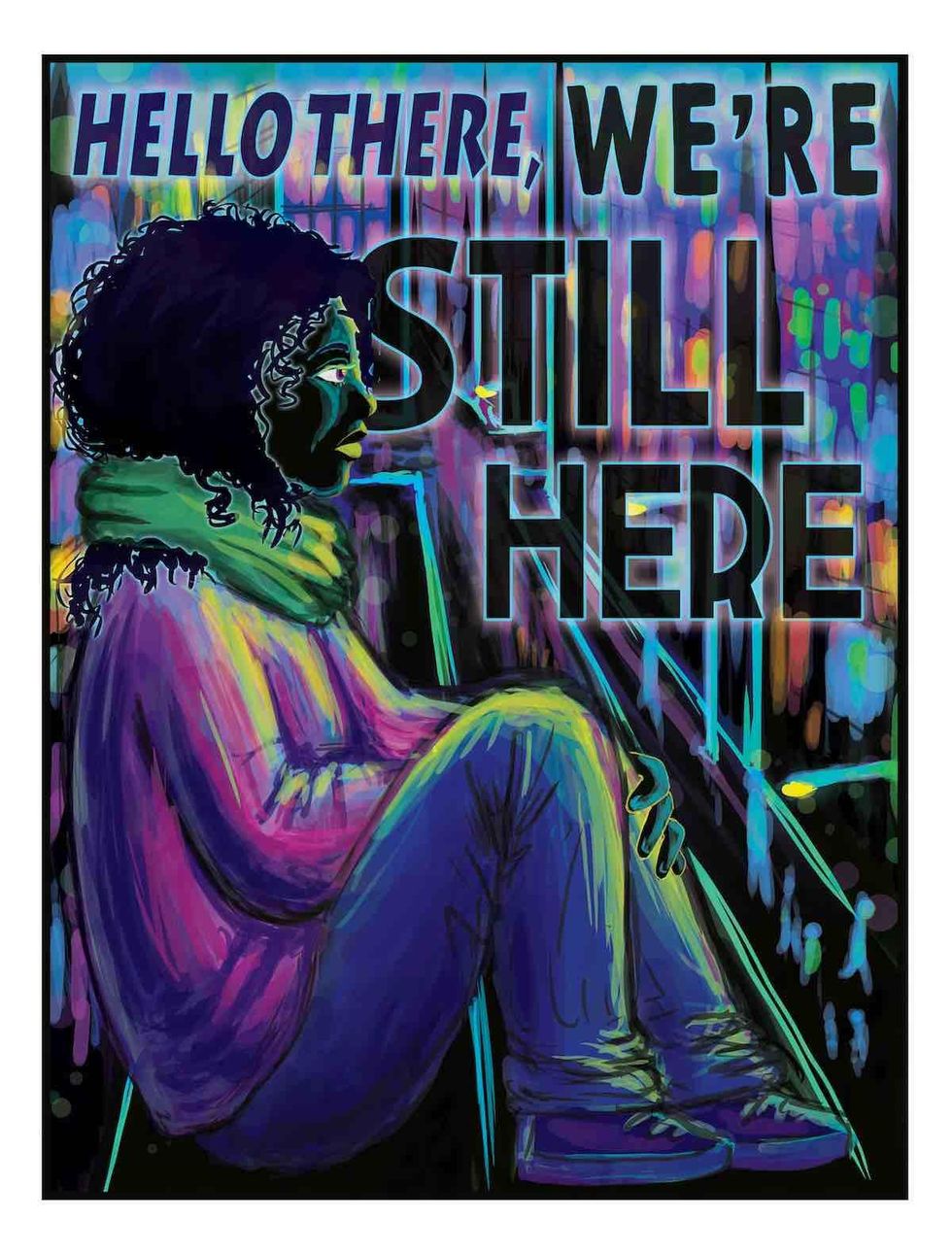Street Spirit is a newspaper that covers housing and homelessness from the perspective of those most impacted, sold on the street by vendors to support themselves. The March Anti-Eviction Art Special Edition is packed with ready-to-use giant fold out poster art (many in the article below) and songs to support widespread use of the arts in resisting evictions--and to share examples and resources to help. You can get the art and songs at our online ARTS AGAINST EVICTIONS ART KIT or ask us to send you a newspaper (and donate if you can). Here is our lead article from this Edition.

You are holding a tool. We packed this issue of Street Spirit with artwork and songs we hope you will use to stop evictions and house us all. Please use the posters to decorate your windows, your camp, or your vehicle. Bring them to public actions. Tape or wheat paste them in the streets. An uprising is needed to protect our community: to house our homeless neighbors and to keep our housed neighbors in their homes.

When we talk about "eviction" we mean eviction of tenants by landlords, homeowners evicted through foreclosure, and houseless people evicted from encampments. The lack of public support for our communities during the pandemic puts all of us at risk, including those living without housing and those threatened with eviction or foreclosure.
Before the coronavirus pandemic, the housing crisis was already decimating our communities. Now, experts say some-40 million more Americans could be at risk of eviction. This reality has already arrived for the 10 million homeowners who are behind on their mortgage payments, the hundreds of Bay Area tenants who have already been evicted during the pandemic despite the moratorium, and the thousands of unsheltered people across the country who continue being swept from one vacant plot of land to the next.

How can the arts help us stop evictions?
An eviction is a violent and sometimes fatal event. Little things, like posters, might seem powerless in comparison. But we believe the opposite: that beautiful artwork and good storytelling are instruments of great change.
We understand and make sense of the world, our community, and events through stories. The stories we believe about the economy--about evictions and our economic and political system--shape what we accept as right or wrong. Over time, narratives build. Growing accustomed to living within a housing crisis allows us to accept the drastic state of homelessness; to look beyond the thousands who live on our streets. The arts--paintings, drawings, prints, and murals, as well as song and music, dance, and theater, photography and video--are the most powerful tools we have to tell our stories. Art helps others see what we see.

Longtime organizer and visual artist Ricardo Levins Morales wrote, "Humans are story-driven. We make choices according to how we understand the world to be. Art speaks directly to those deep inner spaces where the stories are stored. I use art to support people's ability to believe in possibilities that go beyond the boundaries that are acceptable to the rulers."
Street Spirit is a newspaper that covers housing and homelessness from the perspective of those most impacted. The paper was founded in 1995 to advocate for these voices to be heard, widely and unconditionally. We do so in two main ways. First, when you buy this paper, you interact with the person who sells it to you. During these interactions, you may begin to build a relationship. These relationships narrow the cultural gap that divides the rich from the poor. Second, the stories inside the paper are often written by unsheltered people themselves and are crafted to expand your perspective on the crisis of homelessness.

Through both of these channels, our aim is to enlighten the deep inner spaces that Morales describes. We aim to re-write many of the commonly held beliefs about poverty and those who live within it.
The following are examples of the power of artwork and storytelling. May you be inspired by the power of this medium, and use the artwork in this issue to push for social change.
RIGHT TO LIVE
"Everybody's got a right to live," wrote singer-songwriters Jimmy Collier and Reverend Frederick Douglass "Kirk" Kirkpatrick, in 1968. The song continues, "And if this Campaign fails, we'll all go down to jail." That song became the anthem of the 1968 Poor People's Campaign co-led by Dr. Martin Luther King Jr., and it's one of the key songs of today's Poor People's Campaign, 50 years later. Collier wrote in 1968, "Music is the easiest way to tell the story of what we're trying to do; songs are one of the best tools for getting people together."
FARMWORKERS
My (David Solnit's) experience of witnessing and supporting low wage farm workers' use of arts and culture, together with organizing and alliance-building to transform farm worker conditions in Florida, has shown me the power of art. The Fair Food program that the Coalition of Immokalee Workers have won over the last two decades used arts and culture to win dignity and improvements for farmworkers, against a history of modern day slavery, exploitation and sexual harassment. I asked the Coalition about it and they said, "The corporations who we are fighting have multi-million dollar advertising budgets. We the farmworkers from a small and resource-poor community don't have the same kind of access to the media. We have to be creative about communicating our story."
"Art, images, and theater played a very important role. We were able to show through their use what the reality of our lives is really like. We were able to catch people's attention by making our marches and protests colorful and fun. And through the images and signs we were able to more effectively communicate our message to anyone who might have driven by or seen us on the news or in the newspapers."
AUCTIONEER SONG
On October 11, 2011 community members were sitting in courtroom benches at a city-run home auction in Kings County Supreme Court, in Brooklyn, New York. As the auction of homes started, people began singing,
"Listen. Auctioneer,
all the people here,
are asking you to hold all the sales right now,
we're going to survive but we don't know how."
It was 2011, when the banks got bailed out, the people got sold out, foreclosed homes went up for auction, and marshals and sheriffs were kicking families out.
Poet-organizer Lu Aya, who co-organized the action and wrote the song, says,
"Neighbors, unhoused folks, cultural workers, housing lawyers and people who were under threat of eviction came together to shut down these unjust housing auctions. But how could we grind this massive bureaucracy to a halt? A week later we were harmonizing that melody and belting out that poetry over the sound of a gavel trying to quiet us down to continue business as usual. That day, only one of the three properties that were going to be auctioned was able to be sold. It was a partial victory. And we had done it with song that expressed a simple heartfelt truth."
"People across the nation saw a bumpy cellphone video of the action and heard our call to sing down the auctions. Within a week we began to receive both heartfelt gratitudes from people who felt seen and accompanied by our action - and then something even more amazing - other videos of actions from around the nation. People had been ready for action . . . they just needed a song to make it beautiful and true enough to do it!"
STOLEN BELONGINGS
The Stolen Belonging project brought together--in the words of the project website stolenbelonging.org--"houseless residents, housing justice advocates, human rights lawyers and 'housies' who want to hold the city accountable for the ongoing theft and violence against those who currently have no roof." They organized a "Stolen Belonging" creative action/event that "featured art and written stories gathered by our team over the last seven months, spoken word, and music by Brass Liberation Orchestra. Our main initiative, however, will be supporting and witnessing unhoused folks in their efforts to retrieve possessions taken in the sweeps, which, as SF city policy states, should be bagged, tagged and stored at the DPW yard for 90 days."

Leslie Dreyer, artist and housing justice organizer who works with the Coalition on Homelessness and the SF Housing Rights Committee, described the power of using arts with organizing in a Street Sheet interview: "When you make an action more joyful - joyful and militant - and use art for more militant means to exert our collective power, it changes the way the participants, all of us, feel while doing it. Data doesn't move people. It's personal stories. It's feeling connected to something and art helps do that," Dreyer continued. "It helps people see things on a much more personal level. We can hear innumerable percentages, but until you put some stories and emotion behind it, make it beautiful, make it irresistible, then things may not change."

ART IS A HAMMER
This issue of Street Spirit came about after Editor Alastair Boone invited East Bay Area arts organizer David Solnit to contribute artwork. David, a longtime fan of and occasional contributor to Street Spirit, had been making lots of signs, flags, banners, puppets, and even a coffin to support tenants organizing against COVID-19 evictions. David asked, "What about including a bunch of giant, beautiful posters that could be used to help stop evictions--and songs, too?" Alastair had been wanting to do a poster edition, so was quick to say yes. She then invited David to guest co-edit this special Anti-Eviction Arts Edition you hold in your hands.
Now it's your turn. Please look at the posters and art in this issue, read the songs and poems--and use them.
Bertolt Brecht is thought to have said, "Art is not a mirror to reflect reality, but a hammer with which to shape it." This issue of Street Spirit is a hammer. The designs and songs in this issue--and more--are included in our Anti-Eviction Art Kit online at www.thestreetspirit.org.





